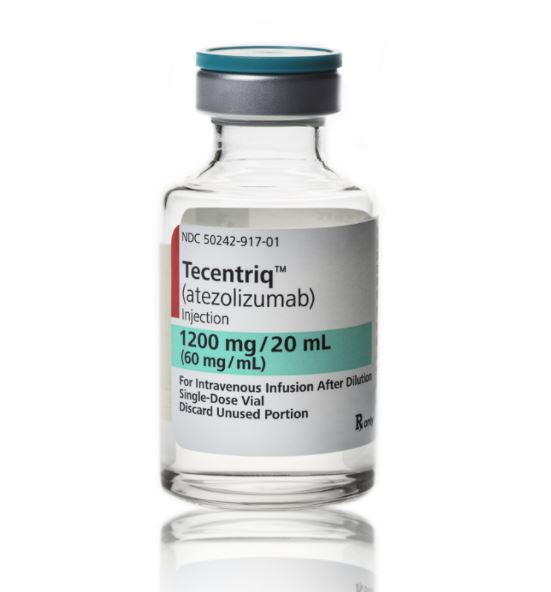Roche's Tecentriq gets fourth European NSCLC indication

Roche’s cancer immunotherapy Tecentriq has been granted a new use by European regulators, for the first-line treatment of certain patients with metastatic non-small cell lung cancer (NSCLC).
Tecentriq (atezolizumab) has now been used in Europe for adults with metastatic NSCLC whose tumours have high PD-L1 expression.
The tumours must also have no epidermal growth factor receptor (EGFR) or anaplastic lymphoma kinase (ALK) mutations.
Approval is based on Roche’s phase 3 Impower110 study which showed Tecentriq monotherapy improved overall survival by 7.1 months in patients with high PD-L1 expression compared with standard chemotherapy.
Safety for Tecentriq was consistent with its known safety profile, with no new safety signals identified. Grade 3–4 treatment-related adverse events were reported in 12.9% of people receiving Tecentriq, compared with 44.1% of people receiving chemotherapy.
This is the fourth indication for Tecentriq in NSCLC – it can also be taken in combination with Roche’s Avastin plus paclitaxel and carboplatin in first line non-squamous disease and in ALK-positive NSCLC after failure of other targeted therapies.
It can also be taken in combination with Bristol-Myers Squibb’s Abraxane (nab paclitaxel) and carboplatin in non squamous NSCLC without EGFR mutant or ALK positive NSLC.
Tecentriq is competing in the wider cancer market with the other two big checkpoint inhibitor immunotherapies, Merck & Co’s Keytruda (pembrolizumab) and BMS’ Opdivo (nivolumab), which can be used in multiple different types of cancer.
Roche is continuing to develop Tecentriq in lung, genitourinary, skin, breast gastrointestinal, gynaecological and head and neck tumours.
This includes use as a monotherapy and in combination with other medicines.
Last week, FDA advisers voted to keep Tecentriq as a treatment for triple negative breast cancer, during a review of several cancer drugs quickly approved on the basis of early data.
Although the decision of the Oncologic Drugs Advisory Committee (ODAC) was non-binding it’s unusual for the FDA to rule against the recommendations of its experts.












